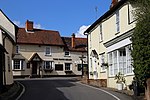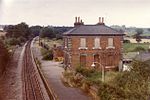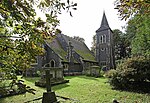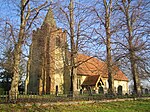Bobbingworth

Bobbingworth is a village and civil parish in the Epping Forest district of Essex, England. The village is situated approximately 3 miles (5 km) north-west from Chipping Ongar, 10 miles (16 km) west from the county town of Chelmsford, and lies off the A414 road. Bobbingworth is in the parliamentary constituency of Brentwood & Ongar. Bobbingworth covers an area of 2,595 acres (10.50 km2). According to the 2011 Census the parish had a population of 280.A notable building in Bobbingworth is Blake Hall, which, after the bombing of the North Weald Aerodrome in September 1940 (during the Second World War) became the R.A.F. Station Headquarters. Blake Hall tube station, now closed and to the south of the village, was named after the building.
Excerpt from the Wikipedia article Bobbingworth (License: CC BY-SA 3.0, Authors, Images).Bobbingworth
Gainsthorpe Road, Epping Forest
Geographical coordinates (GPS) Address Nearby Places Show on map
Geographical coordinates (GPS)
| Latitude | Longitude |
|---|---|
| N 51.7295 ° | E 0.2214 ° |
Address
Gainsthorpe Road
Gainsthorpe Road
CM5 0NF Epping Forest
England, United Kingdom
Open on Google Maps








